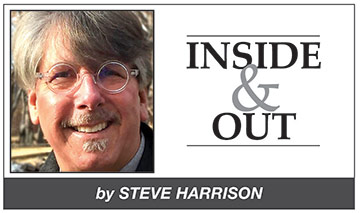What’s all the shouting about?

by Steve Harrison
When I was a kid there were a few simple rules for social engagement. First, don’t ask people how much money they make. Second, don’t talk about sex or politics, especially during family dinners. Third, save your relationship with religion or a supreme being for Sunday morning. Finally, leave the conversion of others to the missionaries of whatever philosophy was offering salvation: spiritual, economic, political, or psychological.
And by missionaries, I mean experts, people who had the calling, the training, the platform, and the authority to offer up instructions, solutions, suggestions, or alternatives to life’s travails; not any Tom, Dick, Harry, or Karen with an opinion and an axe to grind. Those are just bullies.
Something has gotten muddled in the last 10 years. People feel it their duty to “save” everyone else. If we keep our opinions and beliefs to ourselves, we are somehow showing we aren’t that convinced of our truths. On one of my former student’s Facebook page, she posts the motto: “We are lions, not sheep. Do not comply,” blending her religious zeal with her political concerns. As a teacher, however, I battled the “But it’s my opinion” syndrome, trying to convince my students there was a difference between fact and opinion. A little bit of skepticism keeps us healthy and often keeps us from crossing over into bully territory.
Today I’m troubled by all the rude social interactions that are perceived as funny, witty, or superior. When I was young, being seen and not heard was desirable for the young, but it also was the rule for older people too. People didn’t want to offend. Then came Howard Stern and a platoon of shock jocks, housewives of every city and their league of mean girls, and a president with his minions who thought making fun of the old, the disabled, the different, or the unlucky, were completely within their privilege. Suddenly, lack of manners was cool; political correctness is for fools; my opinion is my truth and you must listen when I want to share. Social media elevated regular people to platforms similar to Walter Cronkite and Barbara Walters.
TikTok, Facebook, and Instagram have made us all stars. We may know nothing, but we have followers. We don’t quite know how to relate to someone not on Zoom or in a text. If we disagree with someone, swipe left; if they agree with us, swipe right. The phone can tell us there is a flash flood warning when there is not a cloud in the sky. We are clueless from information overload, not sure if the sky is really falling because our devices aren’t in sync with reality. Social media elevates us and continually reminds us, like Mick Rhodes commented a few COURIERs ago, that the world is ending. It’s not new; it’s just harder to avoid.
There are so many polarizing topics these days that generate such discomfort, with the loudest voice or the pithiest retort deemed the winner in any debate. One wonders if that old-time religion — with the accompanying belief that it was best practiced in silent prayer, on Sunday’s pew, or in the voter’s booth — isn’t the best for civilized discourse.
How often is our palaver fueled by a Facebook post really intended only for those of like minds, preaching to the choir as it were, or to draw lines in the sand, not really to encourage a fair, two-sided discussion wherein maybe the only outcome is an intimacy achieved by talking (not yelling) something through? For if the fight is respectful and compassionate, it might be entirely possible for either party to see the light and convert to a new way of thinking, but these days who really wants that?
When I hear the refrain “Make America Great Again” I wonder if the speaker realizes that along with the queers and the immigrants, the women and the elite, America of yesteryear wouldn’t tolerate their kind of rudeness.








0 Comments